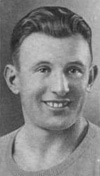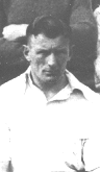THE MOSSLEY AFC 'HALL OF FAME'


Born in Yorkshire in 1902 he arrived at Manchester City in December 1924 from Doncaster Rovers. Quickly he established a reputation for his heading ability. Matt Busby, who played with Cowan throughout the early 1930s remembered: "He could head a ball as far as most of us could kick it." The legendary Dixie Dean, who many would argue was the greatest header of the ball of all time, was also a great fan and aerial duels between City and Everton always became Cowan v Dean. In addition to the three Wembley FA Cup Final appearances, Cowan won a Second Division Championship medal, and earned three English international appearances (France, Belgium and Austria) between 1926 and 1931. He also appeared for the Football League and in an England trial match (The Rest v England 1931). After a total of 407 League and Cup matches and 24 goals, he was transferred to Bradford City for a fee of £2,000 (Bradford's second highest at that time) but, in the summer of 1937 Cowan was appointed player-manager at Mossley. He brought in centre forward David 'Dai' James (later transferred to Chelsea) from Leeds United and James responded with 42 goals (including six in one game). Cowan led Mossley to a highly respectable 7th place in the then powerful Cheshire League and also to 2-1 Manchester Challenge Shield Final win over Ashton National at Hurst Cross. He made several other crucial signings for the Lilywhites, not least inside forward Harry Brierley from Rochdale who scored 20 goals, former Manchester City favourite Dick Threlfall, former Sunderland wing half Arthur Welsby and ex Wrexham and Oldham Athletic goalkeeper Bob Foster. Cowan made 39 appearances for Mossley scoring one goal. At the end of the season Cowan resigned to become Brighton & Hove Albion's trainer. He then accepted the Manchester City manager's job in 1946. Despite his many strengths, the appointment was not a long one. He guided the Blues to promotion, but found it difficult to concentrate at Maine Road. he wanted to continue his life in Brighton and he resigned in June 1947. He then set up a lucrative physiotherapy business in Hove and worked with Sussex C.C.C. and Brighton Ice Hockey Club. Later he became masseur to the M.C.C. for their 1962 Australian tour. Sam Cowan collapsed on 5th October 1964 while refereeing a charity match in aid of Sussex wicketkeeper Jim Parks. It was a big showbiz affair with celebrities such as Tommy Steele taking part. Cowan, aged 62, died in the dressing room..